- Home
- Scott Kenemore
Zombie, Indiana Page 2
Zombie, Indiana Read online
Page 2
Sometimes Dazey left the Eastern District for a while, drifting around the city. He had a rotation of rough neighborhoods. Places with no-name used car lots, strip clubs, cheap motels, and pawn shops. Dazey’s idea of time well spent was to pull some kind of small-time job—stick up somebody after they used the ATM, say—and then use the money to hole up in a sleazebag motel for a week with a bunch of dope and a girl or two. As near as Nolan could tell, Dazey had never had a permanent address in his adult life.
The problem for Dazey was that Indianapolis was changing. There were fewer and fewer neighborhoods where he could go unnoticed. Fewer places where people with his proclivities could be out in the open. And he was sitting in one of them right now. Ten years ago, maybe he’d have been okay along Pendleton Pike. Twenty years? Definitely.
But today?
Times had changed.
Nolan reckoned that he and Dazey were about the same age, but Christ, Dazey looked ten years older. He acted older too. Though there were still signs of an innate natural cleverness, his brain was beginning to addle from the drugs. He had the permanent grey-brown shade of speed use under his eyes, and his frame was wiry and bedraggled in a way you just didn’t come back from. Dazey also wore a brown, stubbly beard that came up nearly to his eyes. This might have once appeared rugged or even handsome. But now, in his premature dotage, it made him look even more like a beat-up Muppet.
“This guy giving you any trouble, girls?” Nolan asked.
They smiled but did not reply.
“That’s harsh, man,” Dazey protested. “Haaaarsh. You don’t have to be that way, man.”
“Why don’t you let me give you a lift, Nathan?” the policeman asked, not waiting for the young women to respond. “It’s free of charge. Anywhere on the east side. Your choice.”
Nolan understood the value of putting a favor in the “favor bank” with a useful informant, even one as grizzled and hoary as Dazey. (Maybe especially with one like that.) He also understood that Dazey’s welcome at this location was a short hair away from running out entirely.
“I don’t have to,” Dazey asserted, looking up at Nolan. “I mean . . . yeah, I’ll take a ride. That sounds good. But I don’t have to. Just so that’s clear. I’ll take it ’cause we’re friends.”
Dazey collected himself and strode toward the passenger door of the squad car.
“Try again,” Nolan said.
“Oh come on, man,” Dazey protested. “Come on.”
Dazey hazarded a look back at the two girls on the curb. They were still looking at the tall officer, and not at him.
“In the back,” Nolan said, stepping over and opening the rear door.
Dazey frowned and shuffled inside.
“You don’t need to tell me to watch my head,” the addict insisted. “You ain’t arrestin’ me.”
“Of course not,” Nolan said. “You’re my guest.”
Nolan shut the back door and prepared to climb into the driver’s seat of the cruiser.
“Hey officer,” one of the girls called. “Do I know you from somewhere?”
Nolan stopped and smiled. He didn’t know her from Eve.
“Yeah,” said the other girl, as if on the cusp of remembering. “Were you maybe on television or something? Like, back in the day?”
It seemed impossible to Nolan that they should know. At the height of his fame, these girls would have been around five years old. Then again, this was Indiana. Some things they never forgot here. Some things were sacred.
“You ladies keep it safe,” Nolan responded with smile. He climbed back inside his cruiser and shut the door.
He turned on the engine, and Dazey started in.
“Daaaamn, champ,” the addict called from the back seat. “That was a close one.”
“It was,” Nolan agreed, pulling out of the parking lot. “By the way, where are we going? And remember, I said east side.”
“Just a ways down Pendleton,” Dazey replied. “Just a bit east of here. You know . . . a bit.”
Nolan suspected there was no specific destination in Dazey’s mind.
“Now, if it were me . . .” Dazey continued, returning to the topic at hand. “If it were me? Sheeeeeet. I’d be dropping it myself. Telling people every time I got a call. Every time I got a kitten out of a tree. I’d let people know exactly who I was. That’d get you mad-laid, son. In this town? Mad-laid.”
Nolan, who was recently divorced, considered this for a moment.
Then his cell phone rang.
“You go ahead and take that,” the addict said, as if his benison were required.
Nolan smiled, pressed the talk button on his phone, and said hello. Then he listened quietly to an intense, rattled voice on the other end. A few moments later, he turned on his bar lights and pulled a U-turn into the oncoming lane. Dazey was momentarily rocked against the side of the squad car.
“Day-um,” the addict protested. “What’s got into you, buddy?”
“Change of plans,” Nolan said, putting down his cell. “I’ve got to let you out right here . . . unless you want to head south with me. And I mean south. I could drop you off in Bloomington, if you like.”
Dazey scratched his hairy chin and thought.
“Naw,” he determined. “College girls are too snooty. Think they know every damn thing. You best leave me right here.”
Nolan pulled over and opened the rear door.
“Be good, Nathan,” Nolan said, wagging his finger in the scruffy man’s face. “Good.”
“Always am,” the addict said, smiling through yellowed teeth.
Nolan hopped back in his cruiser and pulled away. Dazey, inherently suspicious, wondered if this might be some sort of a ruse. Yet the cruiser disappeared into traffic and stayed disappeared. Dazey decided he had been genuinely abandoned.
He relaxed and surveyed his surroundings. By chance, Nolan had dropped him almost directly across the road from the fast food restaurant where the two girls still sat.
Unable to believe his luck, Dazey jaywalked through the oncoming cars and caught up to the girls just as they were finishing their chicken.
“What’d I tell you?” Dazey called as he loped closer. “Me and him go way back.”
“So wait,” one of the girls said. “Was that really . . .”
“James Nolan?” Dazey said with a smile. “Yes it was.”
“Omigod,” said the other girl. “I so thought it was! And he’s a cop now?”
“Sure is,” said Dazey.
Feeling that his fortunes were improving by the moment, Dazey sat back down next to the girls.
“And he’s not just any kind of cop. My man James is a ‘Special Sergeant.’ Does stuff for the highest-ups in the city. The mayor. The secretary of state. The damn governor hisself.”
“Oh, wow,” one of the girls said, seemingly without irony.
“Yes . . . yes, indeedy,” Dazey said, rubbing his chin as he sized up his odds.
The girls leaned closer.
“Listen . . .” Dazey cooed conspiratorially. “You girls wanna come get high with me, and I’ll tell you all about him? I’m only offering because y’all seem like cool chicks. I don’t tell just anybody what I know about James Nolan . . .”
The young women looked at him, then at one another. Both hesitated, waiting for the other to speak first.
Dazey liked his chances.
3
Kesha Washington, aged fifteen, sat in the back of the metal rowboat and tried not to think about how badly she had to pee. Everyone on the tiny, overcrowded vessel was uncomfortable, but Kesha’s seat in the extreme rear—which made extending her legs even slightly a near impossibility—seemed like the worst of the bunch. They were really packed in. Twenty-five high school sophomores, two teachers, and one boring park ranger . . . all in three cramped rowboats.
The boats were on a river—perhaps eight feet across—over two hundred feet below the earth’s surface in a network of caverns beneath southern Indiana. The a
ir smelled like an aquarium that had gone unattended, and where half the fish were dead. Lights had been affixed to the odd stalactite or stalagmite every fifty feet or so, but it was still very dark. Mostly the group relied on the single beam cast by the park ranger’s flashlight. Beneath their boats, the water was filled with horrible, wriggly things, like blind cave-fish and crawfish. The tiny creatures were bone-white and shimmered translucently whenever the flashlight caught them.
Ahead of Kesha’s group were two other identical groups, also crammed into three boats apiece. The entire sophomore class was required to attend this tour. Seventy-five students in all.
The park ranger had just finished a lecture about the ice age that had formed the caverns over two million years ago. (He had already covered the difference between stalactites and stalagmites, and the kinds of fossilized remains—mostly black bear and bison—you could count on finding inside the caves.) The final part of the tour, he’d said, would involve the deeper areas that had been used by Native Americans for over four thousand years.
Now, however, there was a lull in the educational narration as the ranger stopped to futz with his walkie-talkie.
“I hear they’re canceling this trip next year,” Gillian whispered into Kesha’s ear. Gillian was the daughter of a dentist and one of Kesha’s best friends. She was smashed next to Kesha in the ass-end of the boat.
“Oh yeah?” Kesha whispered.
“Yeah,” Gillian confirmed. “We’re the last class that has to do this. Like, ever. Enough people finally complained.”
Kesha nodded. She knew that by “people,” Gillian meant “parents.” And that these parents had complained only because their sons and daughters had insisted they do so.
This flow of procedure did not seem normal or natural to Kesha. Precisely for this reason, she understood that it must indeed be so.
This school—Indianapolis’s most expensive private high school—was very different from the public institutions in which Kesha had spent her first thirteen years. But she was learning its rules quickly. Kesha was one of two sophomores on full scholarship, and one of only three black students in the entire high school. The private college preparatory academy was as exclusive as it was small. Her classmates included the Hoosier versions of Carnegies and Rockefellers. The grandsons of pharmaceutical magnates, already being groomed to helm the empire. Kids whose parents owned half the car dealerships in the state. The boy whose father owned the local concert amphitheater where all the biggest touring acts played. The sons and daughters of professional athletes . . . or of the people who owned the teams.
For most of her freshman year, Kesha had absorbed the actions and attitudes of her classmates with a bewilderment that came close to paralyzing. Now, in her sophomore year, she was beginning to understand how it all worked. She was beginning to understand a lot of things. Primarily, that her classmates and their parents used money as a lubricant to smooth over the bumps and rough patches in life. It was their snail-slime. The thing that kept them moving forward. Did something look like it was going to hurt? Money would smooth it over. Take away the pointy bits. Make everything “not a big deal.” Having trouble keeping your kid’s grades up? Money could hire private tutors with Ivy League degrees. It could pay for SAT prep and practice tests. It could pay for doctors who understood that their primary function was to provide as much Adderall and Ritalin as a parent deemed necessary. (During Kesha’s freshman year, an investigative reporter for the Indianapolis Star had attempted to learn what percentage of the exclusive school’s student body was taking ADD meds. Less than two days into his investigation, the reporter was called off his story by the paper’s senior editor. A week later, he was quietly demoted.)
Kesha found that money meant walking around in a world cushioned from any real consequence. Little things that worried Kesha did not even pop up on the radar of her schoolmates. If Kesha—who, at fifteen, had a learner’s permit to drive—crashed her car into the garden gnome on her neighbor’s lawn, it would be a big deal. Her father would have to pay for the gnome, and that might mean the family going without something. However, if one of Kesha’s peers drove over a garden gnome, everyone involved would have a laugh, the parents would buy the neighbor ten new gnomes and a case of Omaha Steaks to say sorry, and it would be a cute story.
Yet amid and among this absurdity—Kesha’s parents had assured her—this school was, somehow, the best place in the state of Indiana for her to be. The place where she could get ahead. Where she could be part of the “good life.”
Whatever that meant.
So what if the school was snooty, and far from her house, and sort of sounded like “rotted crap” spelled backwards? This was where she should want to be. These strange, moneyed social mores should be her mores. These attitudes should become her attitudes.
Lately it had not been quite so paralyzing, but instead left Kesha with the feeling of being an impostor. Of being a snail that made no snail-slime. Of someone whose mistakes might still have consequences.
“Okay, okay,” said the park ranger, gesturing with his flashlight to quiet the students. “Apparently we’re having trouble with the walkie-talkies. While we wait for them to come back on, we’re going to do something called ‘cave thunder.’ It’s a bit of a tradition here. Our first step will be to turn out all the lights.”
The park ranger’s tone said that he expected this to captivate his audience.
Kesha and Gillian exchanged the same weary glance. Kesha shifted in her seat and tried to ease her bladder. The park ranger pulled a small keypad from his pocket. Moments later, the permanent lighting affixed to the walls flickered and went out. The ranger’s flashlight was now the only source of illumination. Moments later, that was also gone.
The students fell silent, but not completely. The odd titter or guffaw still echoed through the cave. The park ranger cleared his throat. Both teachers whispered for the students to quiet down. Soon, there was only the sound of the boats sloshing together in the water.
“Now then,” the ranger continued. “This is cave thunder. There’s no trick to it. I’m just going to hit the side of the boat as hard as I can with my flashlight.”
Again, the ranger paused to let the awesome coolness of this sink in. In the darkness, Kesha rolled her eyes.
“I want you to listen to the sound as it echoes down all twelve miles of cavern,” said the ranger. “If you have sensitive ears, you might want to cover them.”
Kesha stuck her fingers in her ears.
A moment later, the ranger pounded hard on the side of the metal boat. The resulting noise was indeed like a cannon’s discharge. Every student, except for Kesha, jumped a little. The powerful blow echoed again and again. Kesha pictured the sound waves finding their way into every crevice and cranny of the cavern walls. It was several moments before they died away completely. When they did, the park ranger struck the side of the boat once again. Then once more.
“This is so . . . stupid,” Gillian whispered in the silence after the third “cave thunder.”
“Yeah,” Kesha managed. “Totally.”
The ranger struck the boat a fourth time.
“Like, how are we supposed to feel?” Gillian said under cover of the dying echoes. “Impressed? Scared?”
“I think they must be going for ‘educated,’” Kesha said. “Though I don’t know what loud noise in a cave teaches us. Do you feel any smarter?”
“No,” Gillian said, giggling. “This is ridiculous. It’s so unfair that we have to be the last ones to get subjected to it.”
That gave Kesha a thought.
“Maybe he’s trying extra hard,” Kesha whispered. “Like, he wants to win our business back by impressing the teachers. Maybe cave thunder is the special bonus.”
“Right, can you imagine?” Gillian said. “I wonder if . . .”
Kesha’s friend put her comment on hold, waiting for the next bout of cave thunder to cover it. It did not come. Instead, the silence was broken by the
shrill voice of a teacher, one boat over.
“Excuse me, who is rocking the boat?”
The disdain and humorlessness in Mrs. Klumper’s voice was even more pronounced than usual. Kesha surmised in a moment that the round matron could not swim, and was secretly terrified to be in this situation.
“Whoever is rocking the boat, please stop it right now; this is not funny!” Klumper insisted.
Kesha could see nothing. It was the darkest darkness possible.
She could, however, hear a lapping sound slowly increasing in frequency. Someone was, indeed, rocking the boat just ahead of hers.
“What? I’m not!” one of the students cried.
“Jesus,” said another.
“Fucking stop it; that’s not funny!” cried another still.
“Language,” boomed Mr. Pierce, the attendant adult in Kesha’s boat.
Then a loud “Jesus Christ!” echoed throughout the caverns. This one came from Mrs. Klumper herself. A moment later, Kesha heard a splash as 229 pounds of social studies teacher hit the water.
People began to scream outright. There was another splash. Then another. Then sounds of people flailing in the water. In the amplified confines of the cavern, the din was near to deafening. Kesha—very alarmed—again thrust her fingers into her ears. In the lead boat, the park ranger fumbled for his flashlight and turned it on.
In the resulting, spastic beam, Kesha watched the boat ahead of hers overturn and the remaining passengers tumble into the river. Then the first boat—the one containing the park ranger—also began to rock. Kesha could not have sworn to it, but it seemed a long white hand—so white it was nearly pale blue—extended from the water and lighted on the ranger’s shoulder. Startled, the ranger reached for his keypad controlling the permanent lights. He pulled it out of his pocket, looked over his shoulder, and screamed. The handheld device fell to the floor of the rowboat, which was promptly overturned. All aboard tumbled into the underground river. The ranger’s flashlight sank into the murky depths that were now full of blind fish and flailing, confused high school students.

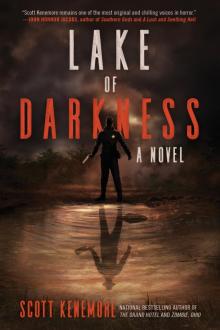 Lake of Darkness
Lake of Darkness The Zen of Zombie
The Zen of Zombie Zen Of Zombie (Zen of Zombie Series)
Zen Of Zombie (Zen of Zombie Series)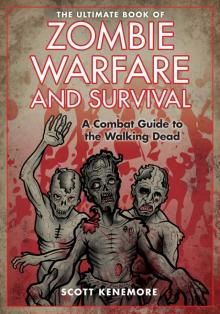 The Ultimate Book of Zombie Warfare and Survival
The Ultimate Book of Zombie Warfare and Survival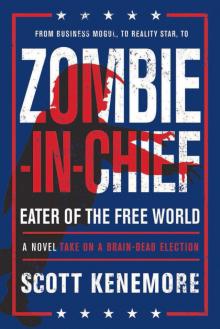 Zombie-in-Chief
Zombie-in-Chief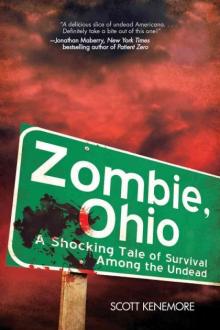 Zombie, Ohio
Zombie, Ohio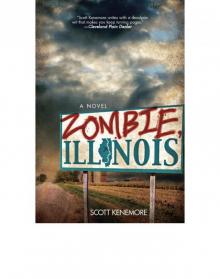 Zombie, Illinois
Zombie, Illinois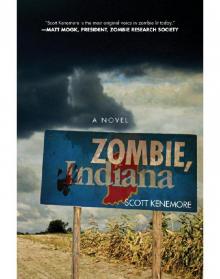 Zombie, Indiana
Zombie, Indiana